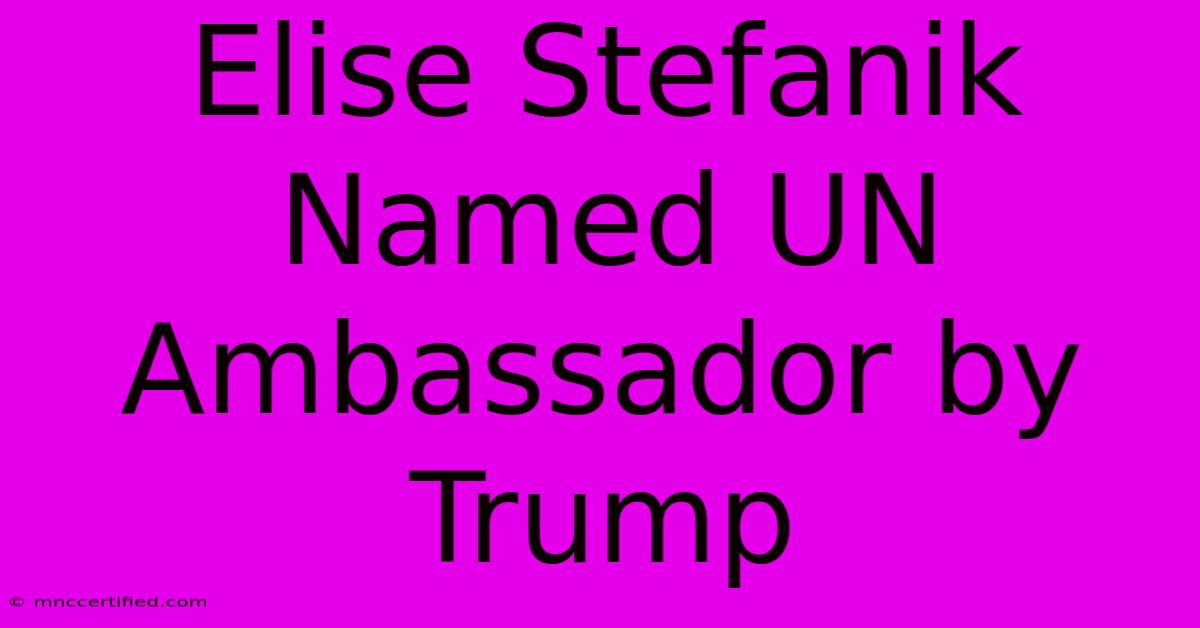Elise Stefanik Named UN Ambassador By Trump

Table of Contents
Elise Stefanik: From Rising Star to UN Ambassador - Trump's Controversial Choice
On September 23, 2020, President Donald Trump announced his nomination of Congresswoman Elise Stefanik as the new United States Ambassador to the United Nations. This move, widely seen as a reward for Stefanik's unwavering loyalty to the President, sparked significant controversy and debate across the political spectrum.
A Young Politician with a Rapid Ascent
Elise Stefanik, a Republican from New York, was first elected to Congress in 2014 at the age of 30, making her the youngest woman to serve in the House of Representatives. She quickly rose through the ranks, becoming a prominent voice for the Republican Party and a fierce defender of President Trump's policies.
Stefanik's rise to prominence was largely fueled by her focus on economic issues, particularly her support for tax cuts and deregulation. She also gained notoriety for her aggressive questioning of Democratic witnesses during Congressional hearings, particularly during the impeachment proceedings against President Trump.
A Nomination Filled with Controversy
The nomination of Stefanik, a relatively inexperienced politician with limited foreign policy experience, to such a prominent diplomatic post immediately drew criticism from both Democrats and some Republicans.
Critics argued:
- Lack of Experience: Stefanik's background lacked the requisite expertise in diplomacy and foreign affairs to effectively represent the United States on the world stage.
- Political Allegiance: Her nomination was seen as a reward for loyalty to President Trump, rather than a recognition of her qualifications.
- Polarizing Figure: Stefanik's partisan rhetoric and her staunch defense of President Trump's policies, even during controversial moments, made her a polarizing figure and potentially detrimental to American diplomacy.
Supporters countered:
- Fresh Perspective: Stefanik's outsider status and her lack of Washington experience were viewed as positive attributes, offering a fresh perspective on American foreign policy.
- Strong Advocate: Her unwavering support for President Trump's agenda was seen as a strength, demonstrating a strong and consistent voice for American interests.
- Rising Star: Stefanik's political success and her ability to connect with voters, particularly in a swing state like New York, were lauded as positive attributes for the role.
A New Era of American Diplomacy?
Stefanik's confirmation as UN Ambassador remains a point of contention, highlighting the deeply divided political landscape in the United States. Her appointment signaled a shift towards a more partisan and potentially less effective American diplomacy, raising concerns about the future of U.S. leadership on the world stage.
The nomination and its aftermath raise crucial questions about the qualifications and experience needed for high-level diplomatic positions. It also underscores the growing polarization within the American political system, potentially hindering the country's ability to effectively engage with the global community.
While Stefanik's time as UN Ambassador remains to be seen, her nomination will undoubtedly continue to be a subject of discussion and debate. Her ability to navigate the complex world of international diplomacy and effectively represent the interests of the United States will be closely scrutinized, both domestically and abroad.

Thank you for visiting our website wich cover about Elise Stefanik Named UN Ambassador By Trump. We hope the information provided has been useful to you. Feel free to contact us if you have any questions or need further assistance. See you next time and dont miss to bookmark.
Featured Posts
-
Best Countries For Airbnb Investment
Nov 12, 2024
-
Stefanik Selected For Us Role By Trump
Nov 12, 2024
-
Are Gevril Watches A Good Investment
Nov 12, 2024
-
Richard Allen Verdict In Libby German Case
Nov 12, 2024
-
Real Estate Investing North Carolina
Nov 12, 2024